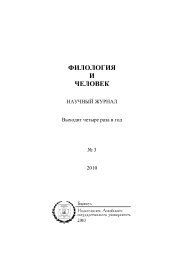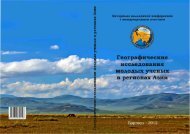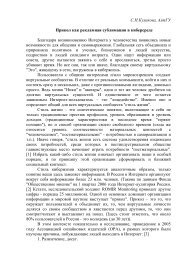Erasmus Mundus Action 1 Compendium 2009 - EACEA - Europa
Erasmus Mundus Action 1 Compendium 2009 - EACEA - Europa
Erasmus Mundus Action 1 Compendium 2009 - EACEA - Europa
Create successful ePaper yourself
Turn your PDF publications into a flip-book with our unique Google optimized e-Paper software.
<strong>Erasmus</strong> <strong>Mundus</strong> Masters Courses<br />
CoDe<br />
Joint European Master in Comparative Local Development<br />
Duration: 1 year 6 months<br />
Course description:<br />
This Masters Course focuses on how regional and municipal development (“local development”)<br />
can support economic and social progress, as well as political and social stability. The Course<br />
educates and trains students through theoretical and practical learning on local development. It<br />
places particular emphasis on issues arising from ethnically complex situations, and provides<br />
direct contact with European best practice. Students will be able to introduce, support and coordinate<br />
transformation at the local level, acting as an interface between organisations and<br />
structures engaged locally.<br />
Master CoDe is fully embedded in the "third wave" of local development. The focus of local<br />
development has shifted from direct intervention to shaping the entire context, including the<br />
institutional, social and business environment more conducive to stabilisation, business and<br />
growth. Thus the focus is placed on public/private partnerships, entrepreneurship, sustainability,<br />
competitiveness, networking and the leveraging of private sector investments for the public good.<br />
Tools used to this end include supporting quality of life improvements, supporting and<br />
encouraging networking and collaboration, providing a competitive local investment climate,<br />
encouraging workforce development and education, developing a holistic strategy aimed at<br />
growing local firms, fostering the development of business clusters.<br />
The target students of the Programme are highly qualified young people, active in the promotion<br />
of local development and cohabitation in their countries.<br />
This interdisciplinary and comparative study programme is comprised of lectures and laboratory<br />
activities in economics, law, political science, sociology and project cycle management, as well as<br />
workshops, internships, language courses, and project discussion groups. The Consortium<br />
provides considerable expertise on the subject.<br />
Participating universities are the University of Trento (Italy), Corvinus University of Budapest<br />
(Hungary), the University of Ljubljana (Slovenia) and the University of Regensburg (Germany).<br />
The Course builds an institutional bridge between “old” and “new” European universities, local<br />
authorities, firms and other organisations in these countries. Prospective partners are the<br />
University of Belgrade (Serbia), the University of North Carolina at Chapel Hill (USA) and the<br />
Tshwane University of Technology (South Africa). The OECD LEED Trento Centre for Local<br />
Development is among the associate institutions.<br />
Student mobility and teaching staff mobility are both integral to the Course. The students' mobility<br />
arrangements will include didactic activities at two partner universities, established on a rotation<br />
agreement. The second part of the mobility track treats students individually: each student,<br />
according to their knowledge base and interests, chooses at which partner university to pursue<br />
the rest of their Master’s activities.<br />
English is the general working language of the Programme. The programme offers language<br />
courses in Italian and German and, upon request, Hungarian and Slovenian. The core<br />
lecturers/students ratio is 1 professor to 3 students. Each student also has a personal supervisor<br />
for project work and one for their internship.<br />
The partner universities award a joint Masters degree to successful students. The Course fosters<br />
strong ties with its alumni in order to guarantee continuous cooperation among them and with the<br />
consortium institutions and countries. Common admission criteria include a university degree in<br />
economics, law, political science, sociology or an equivalent qualification. Applicants must be<br />
competent in English and have good computer literacy.<br />
Website:<br />
http://www.unitn.it/mastercode/<br />
Partners:<br />
University of Trento, Italy (Co-ordinating Institution)<br />
Corvinus University of Budapest, Hungary<br />
University of Ljubljana, Slovenia<br />
University of Regensburg, Germany<br />
24






